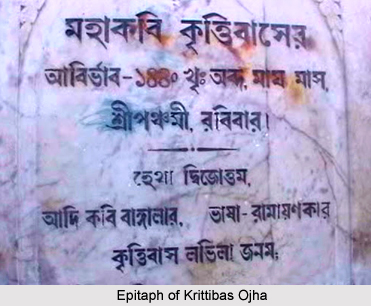 Krittibas Ojha is the medieval Bengali poet whose awe inspiring contribution to Indian literary and cultural scene is the translation of Ramayana in Bengali. In a sense he did make Ramayana palatable to the Bengali clan and kin. Rama Ram Panchali which bears the testimony of his genius is often termed as Krittibasi Ramayan. It was his ingenious work that later inspired the Bengal creative bombs like Michael Madhusudhan Dutta and Rabindranath Tagore.
Krittibas Ojha is the medieval Bengali poet whose awe inspiring contribution to Indian literary and cultural scene is the translation of Ramayana in Bengali. In a sense he did make Ramayana palatable to the Bengali clan and kin. Rama Ram Panchali which bears the testimony of his genius is often termed as Krittibasi Ramayan. It was his ingenious work that later inspired the Bengal creative bombs like Michael Madhusudhan Dutta and Rabindranath Tagore.
Early Life of Krittibas Ojha
Having his roots ingrained in the Kulina (upper class) Brahmin family, Krittibas had his birth fated in Phulia village of modern-day Nadia district in the Indian state of Paschimbanga (West Bengal) and met with his physical decay in 1461. He was the eldest among his father Banamali Ojha`s six sons and one daughter. The word `Krittibas` has an etymological epithet of Hindu god Shiva. An interesting anecdote has been heard that when Krittibas was born, his grandfather Murari Ojha was indulging in a venture for a pilgrimage in Orissa, hence the child was named after Lord Shiva, the predominant deity of the nearest Orissa pilgrimage to Bengal. It was at the age of 11, that Krittibas was sent to North Bengal (in other opinion, to Nabadwip) for higher studies. As he finished his studies with flying colours, he was traditionally honoured by the King of Gauda himself by the offerings of a garland, some sandal water and a silk scarf. Retreat of the native to his home at Phulia, witnessed his translation of the Valmiki Ramayana into Bengali.
However according to certain historians, the Deccan Sultanates who owed their origin to the banishing of the Delhi Sultanates from southern India even had a great role when it came to the making of history, cultural, literary or political. Key offerings to the development in the regional languages did flourish under them and it was a sultan who commissioned Krittibas for the exertion of translating Ramayana in Bengali.
Works of Krittibas Ojha
Krittibas is known for Ram Panchali or Krittibasi Ramayan a timeless Bengali version of the epic which means the March ayana of Rama where the larger than life heroic conducts of Rama and his blood curdling adventures have inspired generations of populace, and for centuries, the epic existed only orally in Sanskrit. The other versions include Shri Ramcharitmanas in Avadhi or old Hindi by Tulsidas, Kamban`s Kambaraamayanam in Tamil, the Patala Ramayanam in Malayalam, and the Bengali Ramayana by Krittivas Ojha. The Ramayana traces a growth of centuries, but the main story however is more conspicuously the design of one mind. The Krittibasi Ramayan is the first work ever on Ramayana that is translated in any North Indian language which includes the scenes of Bengal and descriptions of the pastoral, rustic life and apart from the procedures of the main text. As for example the notion of Akal Bodhan or untimely Durga Puja by Lord Rama during the Autumnal spell was indeed an addition by the veteran Krittibas.
Krittivasi Ramayan was created during the first half of the 15th century which underwent noticeable changes at the hands of various puthi scribes who incorporated their perceptions fuelled by the demands of contemporary genre. The version available currently is the one that was revised by Jaygopal Tarkalankar and was published in 1834. Later in the 20th century various editions were published based on the Jaygopal Tarkalankar version.













